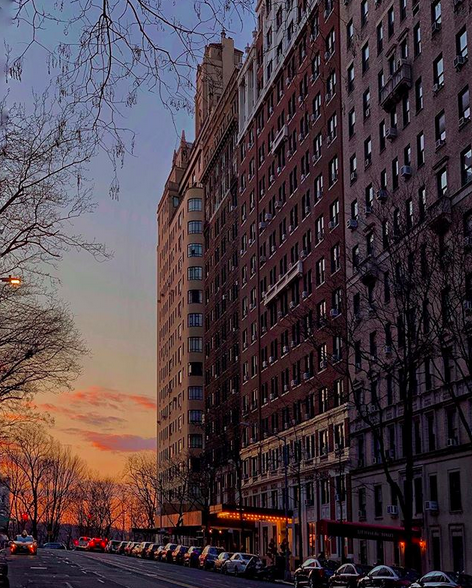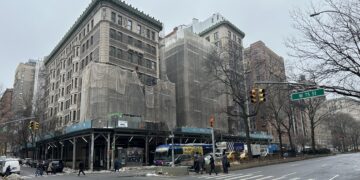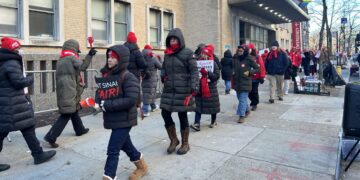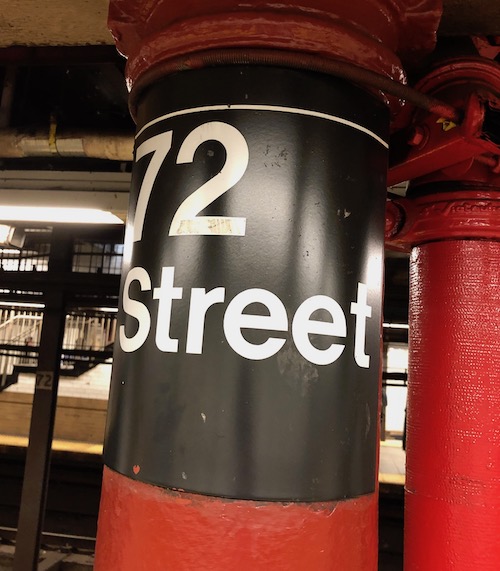By Carol Tannenhauser
The release of a preliminary report proposing reforms of the New York City property tax system on January 31st has people asking who the “winners and losers” will be.
It’s an appropriate question. In May 2008, when Mayor Bill de Blasio and City Council Speaker Corey Johnson charged The Advisory Commission on Property Tax Reform with the task of making NYC’s property tax system simpler, fairer and more transparent, they did so with the caveat that the solution must be “revenue neutral,” meaning it couldn’t result in the city collecting less taxes. It became a zero-sum game — and, according to The New York Times, some co-ops and condos on the Upper West Side could end up on the losing side.
Under the old system, 1, 2 and 3 family homes were assessed for tax purposes according to the value of similar properties around them, i.e., what they sold for. Co-ops and condos were assessed according to the value of the properties based upon the hypothetical income they would generate if they were rental properties. Under the proposal, co-ops and condos would be assessed according to their market value. This would generally result in higher tax bills for people in co-ops and condominiums. People who bought into the neighborhood decades ago when it was a middle-class neighborhood could suddenly be forced to pay much higher rates because the area has gotten more expensive. So a longtime resident whose property value has risen may suddenly have a higher tax bill even if that person has not benefited from the gain in that property value.
The proposal also recommends replacing growth caps on the assessed value of a property with means-tested exemptions. Low-income people might get partial exemptions based upon ability to pay, though the proposal is vague on exactly how. This would function like a “circuit breaker,” limiting tax bills to a certain percentage of household income.
It is also important to note that any change to the property tax system requires state legislative approval, which could take several years. Then, the proposal recommends that the new system be phased in over a five-year period.
A spokesperson for Council Member Helen Rosenthal said about the potential impact of the proposed reforms on her constituents: “The City Council is in the middle of analyzing the property tax reform proposal — it is highly complex. Our office wants to fully understand every aspect of it, and get all our questions answered, before we start to comment on it.”
The Mayor’s office outlined where the proposal will go from here in a press release:
The Commission will hold additional public hearings in each borough to solicit public input before issuing its final recommendations.
In addition to the next round of hearings and extensive stakeholder engagement, the Commission will work on addressing a number of outstanding issues to arrive at a set of final recommendations.









The City says it wants a”simpler, fairer and more transparent’ property tax. Then Helen Rosenthal says it is “highly complex” so which is it?
Issue is “highly complex” because of instructions given to commission that any changes to NYC property tax system be revenue neutral. Thus liberal democrats on city council (and Albany representing same for that matter), have several problems.
As one has repeatedly stated commercial property (which includes rental buildings) pays largest share of taxes. Co-ops and condos come in second with 1-3 family homes dead last (paying least). Thus it becomes like rearranging deck chairs on Titanic.
Much of Manhattan is filled with renters; but SI, Brooklyn and Queens are another story. Fears of “middle class” property owners fleeing city back in 1980’s is how current convoluted system came into existence. Since 1-3 family homeowners pay the least in taxes (on average) it does make sense for that group to take a hit.
Things aren’t that simple as currently many homeowners on say SI pay more in property taxes than many brownstone/townhouse,mansion in Brooklyn or Manhattan. This and or condos or co-op apartments.
Things get even more “complex” because NYC has a huge budget (which has only grown under BdeB’s administration), and property taxes make up a major portion of revenue.
Obviously sensible thing to do would be to lower rates so everyone catches a break. Then decrease spending to match new revenues. In current liberal/progressive democratic NYC government policies this won’t work. Someone or thing has to pay for all the stuff city hall is giving away. Also for the grandiose projects like closing Rikers and building new community jails, free/discounted Metro cards, etc….
NYC long as opted out of the two percent property tax cap Westchester, LI and most rest of NYS has opted into? Why? Because that cap forces decisions on spending by limiting revenue source.
Keep in mind NYC lone aside from Yonkers imposes a city income tax layered over property rates. When you buy a house in NJ, LI or Conn yes, you pay higher property taxes, but that’s it, nothing else.
Great fear is that if revenue drops from real estate taxes NYC would seek to recoup that revenue by raising income tax rates.
Finally higher property taxes often act to bring down home prices. You can find lovely homes in places like Maplewood, NJ for barely $550k to one million USD. But you’ll pay property tax rates of nearly $20k per year.
New York City is the greatest city in the world because of the public goods it offers to all of its citizens. Those public goods are paid for with a robust public budget funded by taxes. Yonkers has chosen to pay lower taxes and get less public services in return. Personally, I much prefer the city. Yonkers is there for those who prefer their way of doing things.
Is it really the greatest city in the world?
As late Dame Margaret Thatcher correctly pointed out socialist governments historically do make a fiscal mess of things; they always run out of other people’s money.
Average middle-class household (or what passes for it in NYC) receives comparatively little back in exchange for huge sums in taxes, fees, surcharges levied and or otherwise extracted from them.
Affordable housing lotteries aren’t for them, nor are any of the free or reduced price things given away by city (Metro cards, feminine sanitary products, etc…).
Those who worked hard to afford a home/apartment in an area with good to excellent public school are now told they are “racist” or “promoting inequality” because their schools aren’t what BdeB and others want.
God forbid they own a car or drive, because we know where that is going as well.
New York city and state are quite good at doing what socialist leaning governments do; wealth redistribution.
I agree. Outside of Cuba, NYC is the last centrally planned economy.
This is years away, but if it passes I wonder if all the super-liberal, left-leaning, Democratic-Socialist party-supporting Condo and CoOp owners on the UWS will think twice about whom they vote for.
that’s easy David I am fortunate to be able to pay taxes I’m grateful that I have the means to be taxed for something valuable that I own. as long as the tax rates are fair and equitably distributed I have no problem paying taxes. but only for the services I enjoy but the aid those who may be in need.
I was going to say something like some of us vote for things other than self-interest but taking care of those around me with money I could afford to spend is in my self-interest
How very condescending of you. I also live on the UWS in a recently acquired 1 bed that is a stretch to own but it has saved me from a grueling 90 minute commute. If taxes go up (and no federal tax relief on SALT) it may be impossible to stay so I will have to cut my losses and get back on the train
If the city wants to “adjust” real estate taxes there should not be partial exemptions or circuit breakers for lower income individuals. If someone owns an asset that has significantly appreciated over time, they always have the option of selling it and realizing the gain.
These giveaways may make these adjustments revenue neutral temporarily but upon a sale, the assessment will go up and the city will have more revenue. Clearly that is the driver of this legislation.
Yes, but of course even if there is such a circuit breaker there is “penalty” to the current owner in that the new buyer, whenever that happens, would be facing a higher tax bill, and will thus offer less money for the apartment. Thus the apartment is worth less, and the long-time holder suffers in that way.
Someone who bought a place that happened to have a high tax rate for whatever reason paid less for it, presumably, and if that person’s taxes go down they get the benefit of the lower taxes and higher future sale value.
Rule-changes midstream like this are tough.
I would imagine this is all more complex than this, but in other reports it seemed that, roughly speaking, if your annual taxes are under maybe 1.25% of the current market value you were looking at a hike if this ever passed. De Blasio, by way of example, seems to be paying something closer to 0.3% of his current market value as a tax, and so it looked like his would go up a lot.
I check mine (co-op) and FWIW it seems I am paying something around 1.25% of a guesstimate of current market value already, and so the effect here might vary a lot *by building* even within a neighborhood. Needless to say, all of this would have to go through Albany, which is not an easy lift.
There is a legal challenge (or two) that NYS and NYC are seeking to have thrown out of court regarding inequity of NYC property taxes. Depending upon ultimate outcome of that legal action Albany’s hand (along with city for that matter) may be forced to act.
https://therealdeal.com/2019/10/15/nycs-bid-to-kill-property-tax-lawsuit-back-in-court/
Many co-op and condo buildings on UWS, UES and elsewhere in city long benefited from being compared to rental housing that was mostly full of well below market rate RS or RC units. This and or market rate rentals were low as well. That is no longer true, and these buildings have been seeing increased property tax bills as result.
One main reason why certain persons or buildings moan loudly (though they would die rather than admit it), about new luxury rental construction in their area is that it will likely mean increased assessed value for their co-op or condo building.
CPW, Riverside Drive, Broadway, Amsterdam, Columbus, etc… people bought in those buildings back in 1980’s or 1990’s (if not before) when UWS was a vastly different place. Surrounded by “cheap” rental housing taxes on said co-op or condo buildings was comparatively low, since about 2000’s rates have been creeping up as UWS has gentrified.
People are already selling due to property taxes. Thus co-op or condo owners are watching how this will play out. Besides rentals there has been a ton of new luxury condo buildings on UWS.
Thanks for sharing. Insightful.
Can someone explain how a market value would be determined for co-ops in this new tax scheme? The property tax is assessed building-wide at the co-op level and then allocated to shareholders based on number of shares. Those shares do not translate 1:1 to market value of individual units. Or is the city trying to assign market value of an entire co-op building if sold/flipped to city hall developer cronies and gutted? Now we know the true motive.
By NYS law all condos and co-ops are taxed based upon comparable rental property value.
In true NYS fashion rather than deal with issue head on, work-around was created in form of tax abatement.
https://www.nydailynews.com/opinion/new-york-tax-attack-co-ops-condos-article-1.1248258
https://www.nassaucountyny.gov/1517/Frequently-Asked-Questions#TAX
Thus any changes to co-op and condo property taxes as a class coming out of Albany likely (and legally) would affect all such units in state, not just NYC.
Simplest fix would be to tax condo and co-op buildings for what they are; owner occupied housing either by creating a separate class, or moving them into current “Class 1” (single-three family homes).
This will certainly be the final chapter in turning NYC into a city of rich and poor. The rich can pay the taxes, and the poor will maybe benefit, but not enough so that they will leave the ranks of the poor. Most of the money will disappear into the maw of the ever-increasing city bureaucracy. The middle class on relatively stagnant incomes, and the retired class, will the ones who will suffer and will possibly have to leave forever.
But hey, like the person up there said, screw them, they can just sell (while being liable for the ‘mansion tax’ and massive capital gains taxes) and take whatever is left and buy a nice place in Florida.
Who needs people who bought property back in the 1970s and 1980s when no one else would anyway? We need more bankers and tech bros. Don’t we?
This will likely raise taxes in already rich areas of Manhattan and Brooklyn and reduce taxes in Staten Island and outer Brooklyn, Queens and the Bronx. Seems fair to me.
If you home is more valuable, you should be paying more taxes. That’s how it works everywhere else. Not sure why those already doing pretty well should be immune from that.
The way housing is supposed to work and works most places in America is you build up equity in the home that you raise your family in. Then when your kids are out of the house and you don’t really need the sprawling home anymore, you sell and downsize, either to a different location (FL) or a smaller place nearby and use the money you cashed out to finance your retirement.
Staying in your huge apartment until you die is a luxury, not a right. I don’t feel bad at all for older people who are forced to downsize. Part of the reason we have a housing shortage for lower income people is that families are granted large homes in housing projects for all of their kids and then when the kids are gone, the parents get to live alone in their 3-4 bedroom apartments. This is not an efficient use of space.
By the way, you only pay capital gains taxes on the sale of a primary residence if, for a married couple, the increase in value is over $500k. I don’t really feel bad for these people.
You are wrong about a few things, but especially about the NYCHA. Indeed, families whose children are grown and gone ARE forced into smaller apartments. For example:
https://bklyner.com/downsizing-fortgreene/
I said this very thing to my daughter yesterday. You will have the very rich and the poor, with many middle class people being forced to leave.
GOOD
Having my co-op taxed at a rate linked to what I could earn by renting it out, when I’m not allowed to rent it out, seems ludicrous. I’m all for removing the cap, as it seems quite undemocratic to say; “if you pay more than X you needn’t be responsible”. However, increasing the tax bill on the 1-bedroom co-op I purchased at the bottom of the market is just the excuse I’ve been looking for to leave.
It is hard to overstate how ridiculous this proposal and the comments in this section are. The city is already dealing with a real estate crash and stores are closing at accelerating rates in part due to the fleeing middle classes. Trumps tax plan eliminating the SALT deduction Just raised taxes on property owners and affected prices dramatically. Now they’re proposing to raise taxes on the same group again. People will be paying effectively three times what they paid before In property taxes. With all due respect, those who say “they can afford it,” seem to not understand that people bought property with a budget in mind, and tripling their property taxes can have dramatic ramifications on peoples lives. When those same people have to sell those apartments to maintain their family’s fiscal health and leave the city, it will fuel the exodus that has already begun. That will reduce tax revenues and reduce or eliminate services. That is how the economy actually works. The city already has the highest taxes in the country when you combine state and local, not to mention property taxes. The middle classes carry the cost of services for the poor in this highly inefficient And bureaucratic city. They have already had their taxes raised under Trump, and are starting to leave. Let’s not drive everyone else away.
It’s amazing how much people have been willing to put up with, honestly.
Nicely said! Thank you
This is a terrible idea.
It should only be considered going forward. Otherwise, you’re punishing people who bought a long time ago but don’t have the income now to match the rise in property values and rents.
if this passes, i will be moving. so will many others, which will lower property values and overall lead to lower taxes.
believe it or not the ordinary “wealthy” people in NYC are already taxed too much. i am not talking about billionaires with tax haven set-ups, but average professionals making low 6-figures. Co-ops are not freely rent-able and should not be charged as if they were.
if i owned a house in bayside, i can rent it out as long as i like. i can create a multi family or a 1-bedroom, i can rent our parking… whatever. can’t do that in a co-op. it’s much more limited.
Crime is rising in NYC, there’s more and more of a push to tolerate lawlessness, and that snowballs. Adding even higher taxes to the mix is going to turn this into Detroit.
NYC is NOT guaranteed to not slip into the 1970s-90s again. Chasing out professionals by taxing them to death is not the answer to anything.
we already pay plenty in federal taxes and state taxes, (which thanks to Trump we can’t deduct from our federal anymore), we pay more than 3% in NYC tax, and we shoulder more of the burden on subways because professionals don’t jump turn styles.
You are ignoring fact many who purchased a co-op, condo or even row house “back in the day” are now cashing out for some very decent sums.
People who paid comparatively little are now selling for ten, twenty or more million. Thanks to changes in tax code, they will be facing far less capital gains tax as well.
Yes, their property taxes may have risen since 1970’s or 1980’s, but so has value and fact they can sell for multiples more (even when adjusted for inflation), so there is that to consider.
I agree with a lot of what you say but one thing to note is that condos generally tend to sell at a premium because they can be rented out – the inability to rent out a co-op is reflected in a lower price. Given where prices are now that might be hard to believe, but it is true.
One could argue that the best way to handle this is for the city to tackle the expense side of things rather than revenues. I am sure many would oppose me on this but employee benefits (pensions and health care) for city workers are ridiculously high compared to all norms. One could argue that this offsets lower salaries but that does not justify the level of these benefits. But good luck fighting the unions to moderate these.
Price difference between condo and co-op units has nil to do with ease of “renting out” or not. And for your information along with anyone else reading not all condo buildings have liberal renting policies either. A condo building can make itself every bit as exclusive as any “white glove” Fifth Avenue co-op. It only takes majority of owners via board approval to make the rules.
Price difference between co-ops and condos comes down to several factors. Largest one is that condos tend to be new buildings with larger units, and tons of amenities.
No one is building new co-op buildings and much of what is out there is pre-war or dates from 1960’s through 1980’s. Included in this group are large numbers of former old rental buildings that converted to co-ops.
https://www.brickunderground.com/agent-referral/the_price_of_co_ops_vs_condos_a_cost_comparison
yeah, you’re not wrong about the co-op condo price difference factoring in the relative rent potential, but even condos can’t usually be rented out as freely as houses, and can’t be modified as easily.
As a practical matter, and factually condos aren’t bought for income generation nearly as often as multi-family homes or rental buildings. in NYC condos and coops are largely intended to be for the people who buy them, and that is how it usually plays out.
Rather than assessing by market value (which is subject to interpretation, problematic for co-mingled properties like co-ops, and potentially unseats long-term family owners of any property) or by rental value (also problematic for co-ops and some condos, given the leases/bylaws do not allow sublet more than 2/5 of the time if at all), we instead assess by square feet (which is easy enough to measure) times a rate that is based on say, distance from some desirable nexus. So there would be a Manhattan rate, that is highest at say midtown or FiDi and decreases by the property distance from there (or for Manhattan just have 2-5 zones). For Brooklyn, it would be highest at Boro Hall/Brooklyn Heights and decreases from there. Same for Bronx and Queens and SI. An alternative is to have one rate by borough, with Manhattan the highest, Bx/Bk/Qn the 2nd and SI last. This system seems more environmentally fair in terms of resource use (linked to property size) and economically fair (assuming people farther away from a center have to pay more for transport to get there for work, shopping or other purposes, so should pay less in property taxes). Since property taxes serve not only to provide revenue but also are a matter of public policy driver, such a rate system may encourage populations and businesses to move to outer areas, which also will help distribute income, wealth, and job opportunities.
For those interested in how NYS and by extension NYC property taxes became the hot mess they are currently, following is a good read.
It all basically comes down to a 1973 court case Pauline Hellerstein vs. Assessor of the Town of Islip
Ms. Hellerstein challenged Islip’s taxation of her home based upon fractional value. This was something all counties in NYS did for ages and was given a wink and nod approval by prior court rulings. This time county/state lost in court and was ordered to “fix” the issue.
Again Albany doing what it does best, punting a problem down road simply mandated fractional property assessment into law. This compelled local counties to change their own property tax laws/rates to be in compliance including NYC. It has been off to races ever since.
https://www.nycourts.gov/reporter/archives/hellerstein_assessor.htm
https://ir.lawnet.fordham.edu/cgi/viewcontent.cgi?referer=https://www.google.com/&httpsredir=1&article=1169&context=ulj
https://www.victorny.org/DocumentCenter/View/148/A-History-of-the-Real-Property-Tax-and-Equalization-in-the-State-of-New-York?bidId=
As with rent regulation this decades old policy has created vast distortions in real estate. Problem is making necessary corrections is politically unpalatable for elected officials in Albany and NYC. Someone’s taxes are going to rise, while someone’s else’s will be reduced. One vote gained, two lost…..
Middle class homeowners on the UWS will be forced from their homes while the billionaires on billionaires row will continue to enjoy their tax abatements. Again DeBlasio and his buddies knownwhere their loyalties lie!
Only 40% of UWS housing market is homeowners, meaning 60% are renters. This mirrors much of Manhattan where renting dominates housing market.
If “middle-class” homeowners are being driven out it likely has more to do with various lunacy by CB, city council and other government than taxes per se.
Because they directly pay property taxes homeowners are likely far more attuned to what they are getting for their money.
Renters in this city are largely protected from full measure of property taxes, especially those living in rent regulated, subsidized, public housing and so forth.
The goal seems to be to make the middle class move out and give the buildings over to the very rich who will no doubt negotiate big tax abatements and the cycle will begin again.
best thing to do is to re assess taxes as properties are sold.. that’s what they do in many towns in Westchester so that people who can afford the taxes pay them.
“charged […] with the task of making NYC’s property tax system simpler, fairer and more transparent”
“The City Council is in the middle of analyzing the property tax reform proposal — it is highly complex”
ಠ_ಠ